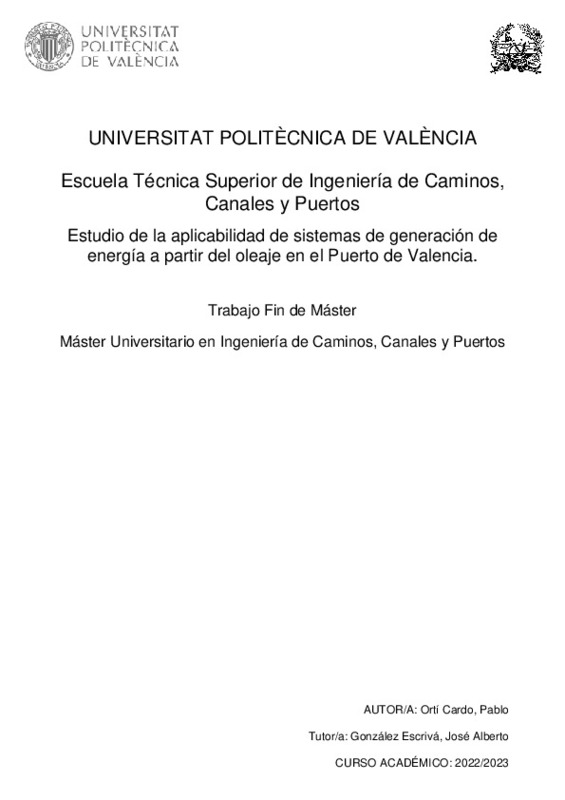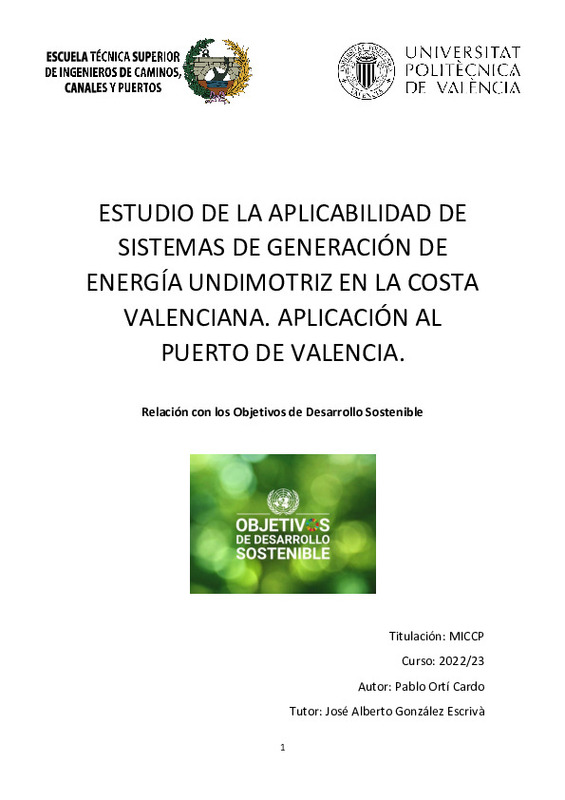JavaScript is disabled for your browser. Some features of this site may not work without it.
Buscar en RiuNet
Listar
Mi cuenta
Estadísticas
Ayuda RiuNet
Admin. UPV
Estudio de la aplicabilidad de sistemas de generación de energía a partir del oleaje en el Puerto de Valencia.
Mostrar el registro sencillo del ítem
Ficheros en el ítem
| dc.contributor.advisor | González Escrivá, José Alberto
|
es_ES |
| dc.contributor.author | Ortí Cardo, Pablo
|
es_ES |
| dc.coverage.spatial | east=-0.31364032532293695; north=39.44696722124631; name=Vía sin nombre, Espanya | es_ES |
| dc.date.accessioned | 2023-11-02T16:15:48Z | |
| dc.date.available | 2023-11-02T16:15:48Z | |
| dc.date.created | 2023-09-29 | |
| dc.date.issued | 2023-11-02 | es_ES |
| dc.identifier.uri | http://hdl.handle.net/10251/199158 | |
| dc.description.abstract | [ES] DESCRIPCIÓN El estudio trata de buscar una fuente de energía sostenible y renovable gracias a la energía del oleaje en la zona objeto del estudio. Es necesario comentar que existe desde hace ya varias décadas una dependencia casi en exclusivo de los combustibles fósiles por parte del ser humano para satisfacer las demandas requeridas de energía, ya sea a nivel global como a nivel individuo. Este Trabajo de Fin de Máster será una búsqueda activa para satisfacer la demanda de energía de ciertas actividades en el Puerto de Valencia y de esta forma aportar una alternativa a los problemas mencionados. ALCANCE En este apartado se especificarán claramente las partes del trabajo que el estudiante va a desarrollar pero, especialmente, las que quedan fuera del alcance del trabajo planteado. El alcance del estudio planteado abarcará lo siguiente: - Estudio del arte de la energía undimotriz - Parámetros principales y criterios de selección - Tipologías para la extracción de la energía del oleaje - Estudios previos relativos a la zona del estudio - Viabilidad (técnica, funcional, económica y constructiva - Diseño de la infraestructura OBJETIVOS Se indicarán los fines docentes que se pretende alcanzar con el trabajo. Permitirá establecer la relación entre el trabajo propuesto y las habilidades que el estudiante debe haber adquirido. El principal objetivo de este Trabajo Final de Máster es la introducción y planteamiento de la ejecución de una infraestructura capaz de aprovechar la energía undimotriz que existe en la zona. PROPUESTA DE INDICE (ver documento adjunto) | es_ES |
| dc.description.abstract | [EN] Nowadays, the world¿s major economies suffer from a dependency on fossil fuels which, over time, are rising the Price, reaching limits that society is not capable of facing. This entails an energy crisis that if war conflicts are added that make it difficult to import these fuels, the crisis worsens in every way. On the other hand, from the Industrial Revolution to the present, human beings have been using fossil fuels, gradually increasing their use, mainly due to the exponential increase in the population and the increase in energy demand at the individual level. All this converges in the problem of global warming, caused mainly by the excess of CO2 emissions expelled into the atmosphere by the combustion of fossil fuels. The increase in the temperature of the globe alters the ecosystems of those species that are sensitive to changes in temperature, as well as the melting of the poles and the subsequent rise in sea level. Given the problem, it is necessary to divert energy sources to meet demand, but do so in a sustainable way, that is, prevent the lowest possible emissions so as not to aggravate global warming. For this, using renewable energy is necessary to meet that objective, such as wave energy. Likewise, this TFM tries to meet the objective of the Port Authority of Valencia to supply all the energy demand of the Port in full with 0 emissions and with renewable energy by the year 2030. Doing it through wave energy that takes advantage of the mechanical energy of waves for electricity. With all this, a state of the art of those wave energy systems or devices has been created, establishing a comparison and selection for the system that best suits the needs of the Port of Valencia. Finally, the feasibility has been studied in different aspects to get as close as possible to a possible implementation of this type of renewable energy. | es_ES |
| dc.format.extent | 75 | es_ES |
| dc.language | Español | es_ES |
| dc.publisher | Universitat Politècnica de València | es_ES |
| dc.rights | Reserva de todos los derechos | es_ES |
| dc.subject | Energía | es_ES |
| dc.subject | Oleaje | es_ES |
| dc.subject | Puerto | es_ES |
| dc.subject | Energy | es_ES |
| dc.subject | Waves | es_ES |
| dc.subject | Port | es_ES |
| dc.subject.classification | INGENIERIA E INFRAESTRUCTURA DE LOS TRANSPORTES | es_ES |
| dc.subject.other | Máster Universitario en Ingeniería de Caminos, Canales y Puertos-Màster Universitari en Enginyeria de Camins, Canals i Ports | es_ES |
| dc.title | Estudio de la aplicabilidad de sistemas de generación de energía a partir del oleaje en el Puerto de Valencia. | es_ES |
| dc.title.alternative | Study of the suitability of a wave energy generation system to the Port of Valencai | es_ES |
| dc.title.alternative | Estudi de la applicabilitat de l.instalació d'un sistema de generació d'energía per onatje al Port de Valèncai | es_ES |
| dc.type | Tesis de máster | es_ES |
| dc.rights.accessRights | Abierto | es_ES |
| dc.contributor.affiliation | Universitat Politècnica de València. Departamento de Ingeniería e Infraestructura de los Transportes - Departament d'Enginyeria i Infraestructura dels Transports | es_ES |
| dc.contributor.affiliation | Universitat Politècnica de València. Escuela Técnica Superior de Ingenieros de Caminos, Canales y Puertos - Escola Tècnica Superior d'Enginyers de Camins, Canals i Ports | es_ES |
| dc.description.bibliographicCitation | Ortí Cardo, P. (2023). Estudio de la aplicabilidad de sistemas de generación de energía a partir del oleaje en el Puerto de Valencia. Universitat Politècnica de València. http://hdl.handle.net/10251/199158 | es_ES |
| dc.description.accrualMethod | TFGM | es_ES |
| dc.relation.pasarela | TFGM\157361 | es_ES |
Este ítem aparece en la(s) siguiente(s) colección(ones)
-
ETSICCP - Trabajos académicos [2365]
Escuela Técnica Superior de Ingenieros de Caminos, Canales y Puertos







